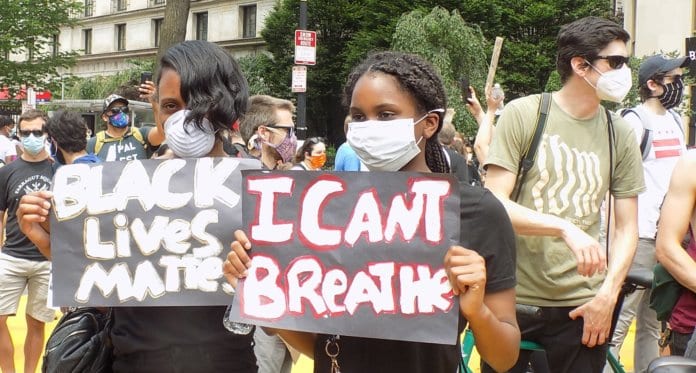Catching Our Breath After the Floyd Verdict
By • April 22, 2021 0 1435

“Guilty. Guilty. Guilty.”
With those three words, this morality play of a trial — with its heroes and villains, its high principles and higher-stakes reckoning — ended with, if not a happy ending, a fitting one. Defendant Derek Chauvin, a cipher to the last, found guilty of murdering George Floyd on May 25, 2020, was led off to prison in handcuffs.
It could so easily have gone the other way, with the victim, not the police-officer perp, on trial. With a verdict based not on justice but on nullification by juries and prosecutors. Sandra Bland. Freddie Gray. Eric Garner. Michael Brown. Breonna Taylor. Oscar Grant. Tamir Rice. Trayvon Martin. Philando Castile. Daniel Prude. Daunte Wright. All denied mercy and justice in their final hours.
George Floyd was different. Why is that? Was it because we were watching more television during the quarantine and had the time to think about the case? Was it COVID itself, making us more attentive to the randomness of life and bad karma? Was it technology? The iPhone video was unimpeachable, making us all witnesses in a way we perhaps hadn’t been before.
Or was it something Darnella Frazier, the 18-year-old who shot that famous video, said in her statement: “When I look at George Floyd, I look at my dad. I look at my brothers. I look at my cousins, my uncles, because they are all Black … And I look at that and I look at how that could have been one of them.”
All those things made us more attuned to this case. We were able to put our privileged point of view aside and identify with Mr. Floyd. To see this situation with new eyes. It could have been any of us or our loved ones suffocating under Chauvin’s knee.
From identification comes empathy. And from empathy comes action and change.
But let’s not fool ourselves. The verdict, satisfying as it was, is not the end of the story. There will be more George Floyds, more difficult conversations and much more work to be done.
For example, the George Floyd Justice in Policing Act of 2021, which covers “policing practices and accountability,” has now arrived in the Senate. As Washingtonians, we have no vote on the matter, but we can certainly advocate loudly for its passage.
Closer to home, D.C.’s Comprehensive Plan, which allegedly articulates a “positive, long-term vision for the District,” embracing land use, zoning and a continuing response to COVID, has been roundly panned by the District Council’s Office of Racial Equity. CORE and like-minded organizations claim that the plan fails to address the historic biases that have created deep inequities in housing and economic development.
Amendments to the Comprehensive Plan are up for a vote in May. We urge our readers to educate themselves and contact their Council member (in Ward 2, Brooke Pinto) with questions and concerns.
On Tuesday, Special Prosecutor Jerry Blackwell stated that he hoped the verdict will “help us further along the road to a better humanity.” To that, we say “Amen.” And if there is to be justice in this world and the next, let us hope that George Floyd has at last been reunited with his “momma.”

